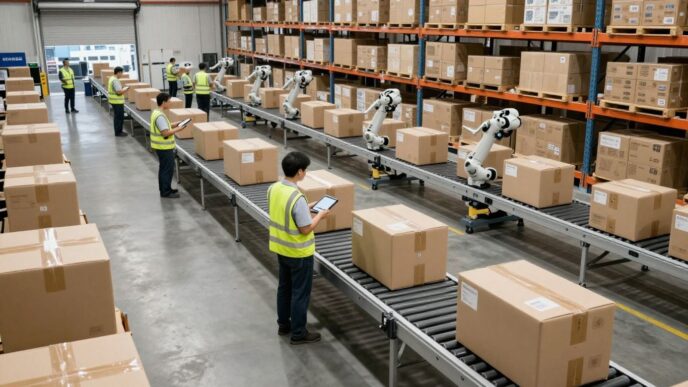The logistics industry is undergoing a significant transformation driven by technological advancements and changing consumer demands. Recent events, including the Defense Logistics Agency’s first Hackathon, have highlighted the increasing role of artificial intelligence (AI) and automation in optimizing supply chains and enhancing operational efficiency.
Key Takeaways
- The global logistics market is projected to reach USD 164.1 billion by 2032, driven by the demand for convenience and technological innovations.
- The last-mile delivery software market is expected to grow from USD 12.5 billion in 2023 to USD 47.7 billion by 2034, reflecting the rise of e-commerce.
- The healthcare logistics market in Canada is set to grow by USD 2.34 billion from 2024 to 2028, fueled by regulatory support and AI adoption.
The Rise Of AI In Logistics
The Defense Logistics Agency (DLA) recently awarded three contracts worth $3.5 million to companies specializing in AI solutions. This initiative aims to explore innovative tools for demand planning, chatbot applications, and virtual agents to enhance acquisition processes. The Hackathon event showcased how AI can address critical logistics challenges, marking a significant step towards DLA’s goal of becoming a digital organization.
E-Commerce And Last-Mile Delivery
The explosive growth of e-commerce has heightened the demand for efficient last-mile delivery solutions. The last-mile delivery software market is projected to expand at a CAGR of 12.9%, driven by consumer expectations for fast and reliable deliveries. Companies are increasingly adopting technologies such as route optimization and real-time tracking to enhance delivery efficiency and customer satisfaction.
FMCG Logistics Market Growth
The fast-moving consumer goods (FMCG) logistics market is expected to cross USD 164.1 billion by 2032. This growth is attributed to changing consumer preferences for convenience, prompting businesses to adapt their logistics strategies. Innovations like AI, IoT, and blockchain are being utilized to optimize supply chains, improve inventory management, and enhance operational transparency.
Healthcare Logistics Evolution
In Canada, the healthcare logistics market is projected to grow by USD 2.34 billion from 2024 to 2028. This growth is driven by regulatory support for pharmaceutical advancements and the adoption of Industry 4.0 technologies. However, challenges such as a shortage of skilled truck drivers could impact supply chain efficiency in the pharmaceutical sector.
The Role Of Major Players
Key players in the logistics industry, including XPO Logistics and C.H. Robinson, are leveraging technology to enhance their service offerings. XPO Logistics, for instance, is known for its innovative solutions in freight transportation and supply chain management, while C.H. Robinson focuses on optimizing logistics through data-driven insights.
Conclusion
The logistics industry is at a pivotal point, with technology playing a crucial role in shaping its future. As companies embrace AI, automation, and innovative software solutions, they are better positioned to meet the evolving demands of consumers and enhance operational efficiency. The ongoing trends indicate a promising future for logistics technology, driven by the need for speed, efficiency, and sustainability.
Sources
- DLA awards AI contracts to close out Hackathon > Defense Logistics Agency > News Article View, Defense Logistics Agency (.mil).
- FMCG Logistics Market to cross $164.1 Bn by 2032, Says Global Market Insights Inc., Yahoo Finance.
- Global Last-Mile Delivery Software Market to Reach USD 47,733.5 million by 2034 Amid Rising E-Commerce Growth and Technological Advancements | FMI, GlobeNewswire.
- Healthcare Logistics Market in Canada to Grow by USD 2.34 Billion (2024-2028), Driven by Regulatory Support for Pharma Growth, AI Powering Market Evolution – Technavio, Yahoo Finance.
- Inside XPO Logistics: A Deep dive into a global logistics leader – theafricalogistics.com, theafricalogistics.com.









